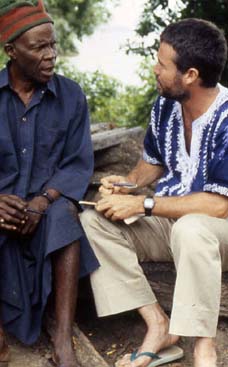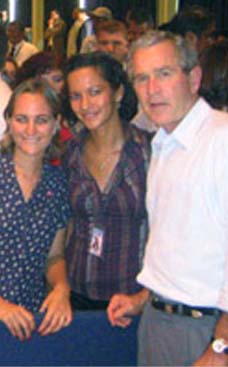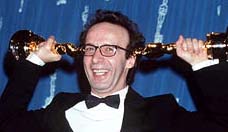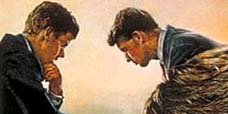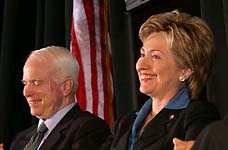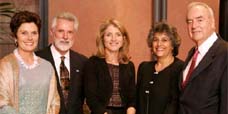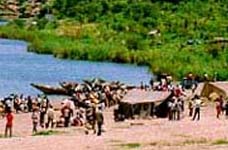
"I think the missing moment here was September 11th. It could have provided that kind of a challenge for this generation. And it did for some people. My son graduated Harvard in June of 2001 and was going to go to law school after working for a year. After September 11, he joined the Army instead for what will be a four-year commitment. He ended up as a combat platoon leader in a slum sector of Baghdad.
He did it because he loved this country. He had no idea when he joined the Army if it was going to be Afghanistan or Iraq, it was simply September 11. It was an extraordinarily hard year for him over there, but in the end, he's seen a world that he wouldn't have seen otherwise. He had 24 kids in his platoon, and he got them all out safely. They were high school kids only, and he bonded with them in a way that he, from affluent Concord and Harvard, would otherwise never have done."
Doris Kearns Goodwin says: If Bush had challenged us, as Roosevelt did after Pearl Harbor, he could have had the public health system expanded to worry about potential biological attack, he could have had more people in the Peace Corps and Teacher Corps, he could have more of us studying languages and cultures just as we did after Sputnik
Real Leaders Have Heart
By Terrence McNally, AlterNet. Posted December 8, 2005.
In her new book about Abraham Lincoln, historian Doris Kearns Goodwin reveals the quality that makes a president great -- his capacity for empathy.
On May 18, 1860, William H. Seward, Salmon P. Chase, Edward Bates and Abraham Lincoln waited in their respective hometowns for the results from the first Republican National Convention in Chicago. Lincoln, the longshot, emerged as the victor over his better-known and more accomplished rivals.
With over 1,000 books about Lincoln in print, what remains to be said? In Team Of Rivals: The Political Genius of Abraham Lincoln, Pulitzer Prize-winning historian Doris Kearns Goodwin approaches this well-known history through the lives of four men and their families. It was Lincoln's extraordinary empathy, she asserts, that enabled him to bring his opponents together, create the most unusual cabinet in history, and marshal their talents to the task of preserving the Union and winning the war.
Terrence McNally: Reading "Team Of Rivals" has been a revelation. These men and women -- and you give the women a real voice in this book -- are more modern and more like us than I had ever assumed, in their psychology, their emotional communication, and their practice of politics.
One of the most important books in my education was "The Making Of The President 1960" by Theodore H. White. The first half of your book feels like "The Making of the President 1860."
Doris Kearns Goodwin: That was not unconscious. I love that book as well. What was so wonderful about it was the way it created the characters, their motivations, their desires, so that you felt them as full human beings. White could write about his contemporaries through interviews, but because the guys in my book all kept letters and wrote diaries, I was able to recreate them almost as fully as you might have in 1960.
Terrence McNally: When they were away in Congress, for instance, it wasn't uncommon for most of these men to write home every single day.
Doris Kearns Goodwin: Even when they were running the Civil War, Seward sends five or eight page letters to his wife each night. We're so distracted nowadays, it's hard to imagine that we would take the time to do that, though email offers a new opportunity.
Terrence McNally: I was impressed with their ability to express emotion. It had been my preconception that this was a modern phenomenon that emerged in the 1940's, '50s or '60s. The self-revealing emotional authenticity of some of their letters is quite surprising.
Doris Kearns Goodwin: Seward wrote that he was looking up at the moon and hoping that the silver rays of the moon are the same moon that his wife was seeing so far away from him. In writing such a thing, you can feel that he loves that woman. When Stanton's wife died, he was worried that their little two-year old son would never know his mother. So he wrote a 78-page letter to that child, which included all the romantic letters that they'd written to each other.
Terrence McNally: I was also impressed by the presence of death. It seems that every one of these men lost a wife, a child or two or three... The book is full of people dying at untimely ages.
Doris Kearns Goodwin: Chase, who becomes secretary of the treasury, had three young wives who died. The first one died in childbirth. The daughter born as the wife died -- she dies at 5 years old. His second wife, who was 18 when he married her, dies in her early 20s. The third one dies shortly thereafter. It's hard to know how they can keep going, except that it's so prevalent. Bates has 17 children, nine of whom grow to adulthood, which means eight of them are lost. Every single one of them lost somebody.
Terrence McNally: Briefly tell us how the book called to you, how you approached it, what it is, and what it means to you now.
Doris Kearns Goodwin: I wasn't sure how to approach it at the start. I only knew that I wanted to study Lincoln and the Civil War. It was scary to consider whether I could come up with my own story. Once I realized that Lincoln put the rivals who'd been against him in 1860 into his cabinet, and the confidence and largeness that took, and how he was able to master them all.... it meant that, used rightly, qualities we normally associate with decency -- sensitivity and compassion, empathy and kindness -- can actually be great political resources.
It made me sad to think what might be possible if we had such a person today, one who realized that human relationships are at the core of politics. If you don't hold grudges, if you tell the truth, if you acknowledge mistakes, if you shoulder responsibility for the failures of others and you share credit -- it's not just that these are good things to do, but you're going to be more successful.
Terrence McNally: -- and the book opened up to you once you found that hook?
Doris Kearns Goodwin: That's right. And I developed such an affection for Lincoln as a result. I'd always respected him as the great emancipator and the great statesman, but it was even more thrilling to find what a brilliant politician he was -- how careful, how crafty, how shrewd.
Terrence McNally: Let me put the next question in some context. It's the late 1850s, early 1860s. With the American belief in progress, half of the nation is moving in a modern direction. They see slavery as an evil. Another set of states says, no, slavery is a cultural institution, essential to who we are.
You choose to fight for the preservation of the Union. You know going in, you're not going to persuade them to change their values; at best you're going to dominate, defeat and humiliate them. You emancipate the slaves, so they become sharecroppers. It isn't until John Kennedy, Martin Luther King and Lyndon Johnson in the '60s that black Americans finally gain many rights. On the other side, you build up deep resentment among whites, which still abides in the present. Was it worth it to preserve the Union at that cost?
Doris Kearns Goodwin: You know, that's a torturing question; 600,000 people died, which would be equivalent to five million today. I think Lincoln would say that he was not simply preserving the Union. He feared that if the South should succeed in leaving the Union, it would prove to the world that ordinary people could not govern themselves.
Something larger was his goal: The idea that we were a democratic experiment. If the minority could just decide to go away, then everyone around the world who wanted us to fail, would say, See, it's impossible to have this kind of a system -- dedicated to the idea that any man could grow up to become president. He feared if the South could leave, maybe the West would leave, or the East at some point -- the whole thing might split apart.
So I think in that sense, maybe protecting the idea of democracy at a time when it was so rare in the world was worth it. But it's a real question: Was it worth it to keep these states together, given what eventually occurred?
Terrence McNally: One can imagine what a United States of America would be now had that secession taken place, had the North said, "You don't want to move with us into the future, okay don't."
Doris Kearns Goodwin: In fact, I think Seward's goal was eventually to take over Canada, and they wouldn't need the South. The North was industrializing, the North had education, the North was moving forward into the stream of the future, whereas the South was stuck in the past.
Terrence McNally: Let me bring it to the present, when Lyndon Johnson -- someone you've worked for and written about -- signed the Voting Rights Act, he said, "I'm writing off the South."
Doris Kearns Goodwin: Exactly, he said he was writing off the South for the Democratic Party for a generation, and it turned out to be true.
Terrence McNally: But in that moment, I believe they didn't just stop being Democrats. I believe they seceded again -- this time from the progressive vision and the New Deal. The Democrats of the solid south were heirs of Roosevelt and the democratic experiment of expanding the middle-class. They'd been going along -- holding to segregation, but otherwise progressive. That stopped.
When I look at the 2004 election, I see the resentment that exploded in the Civil War and raged during the Civil Rights movement, has now been -- as Thomas Frank points out --grafted onto homosexuality, secularism, all sorts of things. And this country is still paying the price. Your thoughts?
Doris Kearns Goodwin: I think there really is something to that. Even before the Civil War, there was a huge cultural difference between the South and the North. I think that since the 1960s that cultural difference seems to have gotten bigger and bigger -- or at least it is being played on more by our politicians.
My husband [Richard Goodwin] tells the story of Lyndon Johnson interviewing George Wallace in 1965 at the time of the Selma demonstrations. Johnson said to Wallace, "Look, how do you want to be remembered? Do you want to be remembered as the man who kept the South segregated? George Wallace, who hated? You have a lot of poor people down there, George, do you want to be remembered as a man who built schools, who built healthcare?" And Wallace teasingly said, "If I'd stayed in there any longer, I would have come out for Civil Rights."
The South was a stronghold of the Democratic party for such a long period of time, and that's all turned around now, and it's because of race.
Terrence McNally: So the resentment exists, but you can't make it about race forever. That would get old. What do we do about that now?
Doris Kearns Goodwin: One has to understand and make the people feel what it is that really matters to them. These cultural issues are not their daily life issues, not as much as jobs, healthcare, their children, their educational systems. Somehow the Democrats haven't been able to come up with a way of talking about those issues so they don't sound like policy but they sound like life.
Do these people really care more about whether two boys or two women are together than about their kids' future? This has to be taken on in a very passionate way, to make people understand what they're doing with their votes. Just as Frank talked about in Kansas.
Terrence McNally: In "The Declaration of Interdependence," Will Hutton, a Brit, points out that America linked freedom to individualism and property rights in a way Europe didn't, because in Europe the property had already been divided. In America a common man could go off on his own and get 40 acres and a mule. Over there, it was, "We're all in this together." He also said the Kennedys were the last ones -- Johnson, I suppose, being even a quirkier case -- who were able to communicate the progressive vision to the working man.
Doris Kearns Goodwin: Especially Bobby Kennedy, I think. Somehow he was able to get through to blue-collar workers who might otherwise have been caught on cultural issues -- able to talk to them about their economic livelihood and the priorities that mattered to their family. But Democrats have to be passionate, they can't be going at this passively. They have to be arguing, they have to be strong.
Terrence McNally: The whole group of men you write about were able leaders. How are we going to get that sort of courage and depth back in this country?
Doris Kearns Goodwin: I think the reason that such a great generation arose during Lincoln's time was that politics was the abiding passion of the country. If you were a young person, politics was the way up. People would come from miles around with their picnics to listen to you debate for four hours. They didn't have as many distractions. They didn't have all the other avenues that might be interesting now to people with energy and talent.
John Kennedy used to talk about wanting politics to be an honorable vocation. If young people don't feel that growing up, you're not going to have your best people entering public life.
Terrence McNally: But it's not just that the good people are going into business. Look at Enron, WorldCom and so on... There's a level of ethical integrity that this country is not living up to.
Doris Kearns Goodwin: I think that's right. But if you want hope, and I know you want hope --
When he's a young man, Lincoln gives the Lyceum speech, and he laments the fact that his generation has no big challenges. He looks back to the Founding Fathers -- he said the Founding Fathers had a huge challenge and they created this great experiment, their names are on mountains and streams, and all that's left for us are modest ambitions. Maybe a term in Congress, at best a presidency without purpose.
Little could he have known that the anti-slavery movement and the Civil War would create that challenge.
I think the missing moment here was September 11th. It could have provided that kind of a challenge for this generation. And it did for some people. My son graduated Harvard in June of 2001 and was going to go to law school after working for a year. After September 11, he joined the Army instead for what will be a four-year commitment. He ended up as a combat platoon leader in a slum sector of Baghdad.
He did it because he loved this country. He had no idea when he joined the Army if it was going to be Afghanistan or Iraq, it was simply September 11. It was an extraordinarily hard year for him over there, but in the end, he's seen a world that he wouldn't have seen otherwise. He had 24 kids in his platoon, and he got them all out safely. They were high school kids only, and he bonded with them in a way that he, from affluent Concord and Harvard, would otherwise never have done.
If Bush had challenged us, as Roosevelt did after Pearl Harbor, he could have had the public health system expanded to worry about potential biological attack, he could have had more people in the Peace Corps and Teacher Corps, he could have more of us studying languages and cultures just as we did after Sputnik. The home front could have mobilized as a result of September 11. If he were a different leader, he could have said "No more tax cuts, I'm going to use it for the public good." Roosevelt said, "I'm no longer Doctor New Deal, I'm Doctor Win the War."
That was the missing moment for this generation.
Terrence McNally: -- and renewable energy.
Doris Kearns Goodwin: Of course. In World War II, people were willing to have rations, they could only use five gallons of gas a week. They took everything in stride because there was a common purpose. The country was ready for that kind of sacrifice. It was all lost and squandered by going into the wrong battles
Terrence McNally: If Lincoln were here today, what might he tell us to help us turn things around?
Doris Kearns Goodwin: I think part of it would be to look and see what the challenges are that can call us to greatness.
Some of those larger challenges have to do with why we're losing prestige abroad, what are we going to do about that, and I think he would ask us to look at ourselves internally first.
Interviewer Terrence McNally hosts Free Forum on KPFK 90.7FM, Los Angeles (streaming at kpfk.org), where he interviews people he believes can help create 'a world that just might work.'





